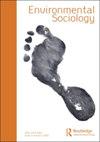What counts as sustainability?: a sociospatial analysis
IF 2.8
Q3 ENVIRONMENTAL STUDIES
引用次数: 3
Abstract
ABSTRACT Sustainability is a ubiquitous term today and one that is central to key environmental and social policy discussions relating to the most pressing questions faced in contemporary societies. In this paper we argue that sustainability needs to be understood in relation to social space. We do so by engaging with Pierre Bourdieu’s thinking tools as well as Edward Soja’s spatial analysis to deconstruct how differently positioned actors understand and relate to space, including how to sustain it. Drawing on focus group and interview data from a small Australian city, we use Soja’s typology to critique spatial tropes and dualistic frames common in sustainability discourses such as ecological/social, global/local, and reveal nuanced interpretations of spatial relations.什么是可持续性?社会空间分析
摘要可持续性是当今一个普遍存在的术语,也是与当代社会面临的最紧迫问题有关的关键环境和社会政策讨论的核心。在本文中,我们认为可持续性需要从社会空间的角度来理解。我们通过运用Pierre Bourdieu的思维工具以及Edward Soja的空间分析来解构不同位置的行动者如何理解和联系空间,包括如何维持空间,我们使用Soja的类型学来批判生态/社会、全球/地方等可持续性话语中常见的空间比喻和二元框架,并揭示对空间关系的微妙解释。
本文章由计算机程序翻译,如有差异,请以英文原文为准。
求助全文
约1分钟内获得全文
求助全文
来源期刊

Environmental Sociology
ENVIRONMENTAL STUDIES-
CiteScore
4.60
自引率
12.00%
发文量
34
期刊介绍:
Environmental Sociology is dedicated to applying and advancing the sociological imagination in relation to a wide variety of environmental challenges, controversies and issues, at every level from the global to local, from ‘world culture’ to diverse local perspectives. As an international, peer-reviewed scholarly journal, Environmental Sociology aims to stretch the conceptual and theoretical boundaries of both environmental and mainstream sociology, to highlight the relevance of sociological research for environmental policy and management, to disseminate the results of sociological research, and to engage in productive dialogue and debate with other disciplines in the social, natural and ecological sciences. Contributions may utilize a variety of theoretical orientations including, but not restricted to: critical theory, cultural sociology, ecofeminism, ecological modernization, environmental justice, organizational sociology, political ecology, political economy, post-colonial studies, risk theory, social psychology, science and technology studies, globalization, world-systems analysis, and so on. Cross- and transdisciplinary contributions are welcome where they demonstrate a novel attempt to understand social-ecological relationships in a manner that engages with the core concerns of sociology in social relationships, institutions, practices and processes. All methodological approaches in the environmental social sciences – qualitative, quantitative, integrative, spatial, policy analysis, etc. – are welcomed. Environmental Sociology welcomes high-quality submissions from scholars around the world.
 求助内容:
求助内容: 应助结果提醒方式:
应助结果提醒方式:


